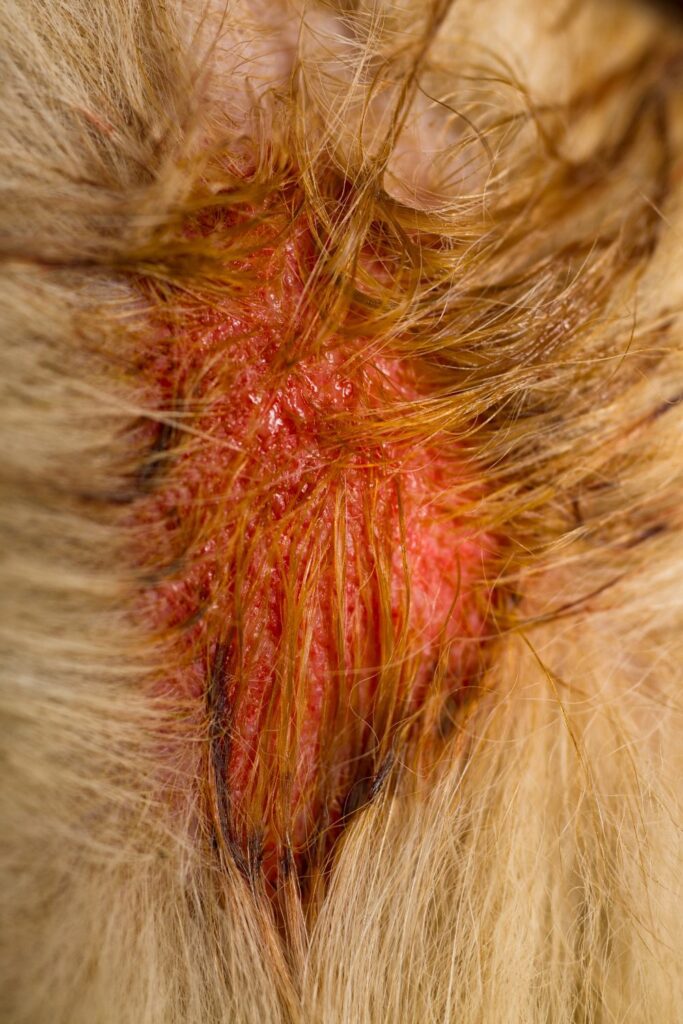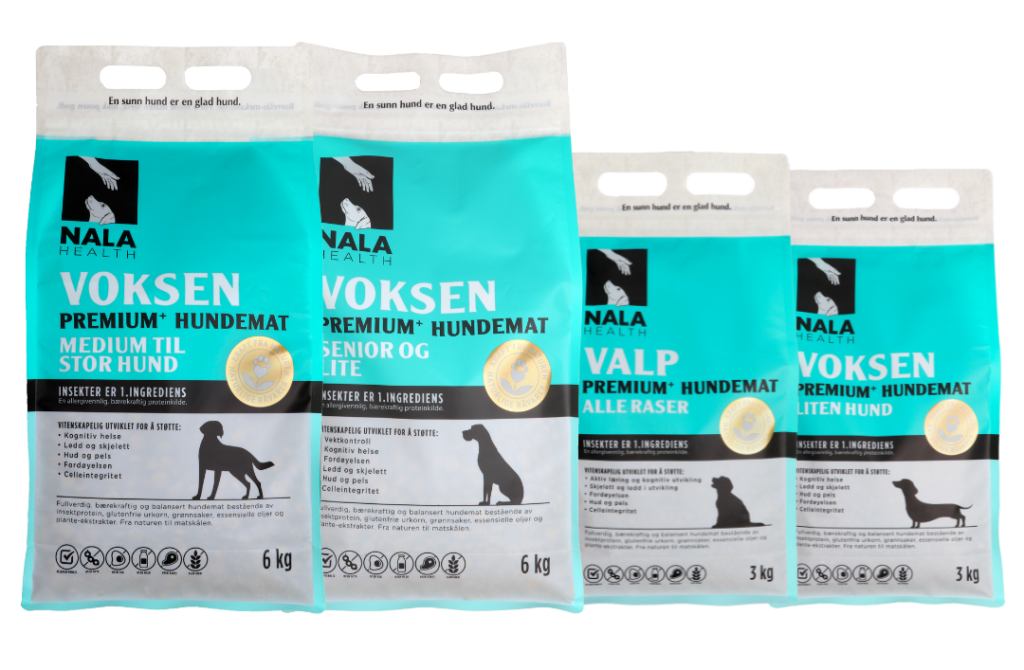Treating and Preventing Wet Eczema
 Synne Hemsen Berg
Synne Hemsen Berg
Wet eczema, also known as moist dermatitis or hot spots, is a common skin condition that can affect dogs of all breeds and ages. It is characterized by red, inflamed, and often painful patches of skin that appear wet or oozing. The fur around the affected area also often sticks together due to the oozing sores. Hot spots can develop quickly and secondary infections in the affected area often follow.
Understanding Wet Eczema
Wet eczema is typically caused by underlying factors such as allergies, flea dermatitis, skin irritations, poor grooming habits or anxiety that causes excessive licking. Dogs who love to swim are also at a higher risk of moist dermatitis, especially dogs with dense coats. Common symptoms include:

- Red, irritated, and inflamed skin
- Moist, oozing lesions or sores
- Wet/sticky fur around the lesions
- Intense itching or discomfort
- Foul odour emanating from the affected area
- Hair loss or thinning around the lesions
Treatment of Wet Eczema
Treating wet eczema requires a multifaceted approach aimed at addressing the underlying causes and providing relief for the affected dog. If secondary infections have also set in then you will often need to treat this alongside the moist dermatitis. Hot spots are also painful, so home treatment should be approached with caution. It is always recommended to seek veterinary treatment for wet eczema.
It is important to note that a condition called lick granuloma looks very similar to wet eczema.
Veterinary Examination
Whenever your dog is experiencing issues the first course of action is to consult a veterinarian. This will help determine the cause of the wet eczema and rule out any underlying health issues. They may perform tests, such as skin scrapings or allergy tests, to identify what triggers your dog to itch. The vet may also want to rule out fleas or other parasites.
Dietary changes
Wet eczema can be triggered by various underlying factors, such as allergies. Allergies to food or things in the environment cause itching and in turn, can cause wet eczema if the skin is broken from scratching. Treating the underlying causes is crucial to preventing recurring episodes of wet eczema.
To treat food allergies, your dog will have to eat allergy-friendly/hypoallergenic food. Dogs with food allergies often react to the source of protein in their current food, so you want to feed them a new source of protein they have never eaten before. Nala Health contains novel insect protein from black soldier fly larvae for example. This is a complete, clean and allergy-friendly protein that most dogs do not react to.

Nala Health dog food
Topical Medications
Your vet may prescribe topical medications, such as medicated shampoos, sprays, or creams, to help alleviate inflammation, soothe the affected area, and prevent infection.
Systemic Medications
In severe cases or when underlying allergies are present, oral medications like antibiotics, antihistamines, or corticosteroids may be prescribed to address the condition and provide relief. Allergy vaccines and injections such as cytopoint can also be very helpful for dogs with environmental allergies.
Cone
To prevent your dog from exacerbating the condition, you can also try to prevent licking, nibbling and scratching the area by making your dog wear a cone. It is not recommended that you wrap the wet eczema, as it needs air to heal and dry out. Covering it in bandages or clothing may worsen the symptoms.

Home Care and Remedies
Alongside veterinary treatment, there are several home care practices and remedies that can aid in the healing process and prevent future occurrences of wet eczema:
Gentle Cleaning
Keep the affected area clean by gently washing it with a mild, pet-friendly antiseptic solution or saline solution. You can easily make a salt water rinse by mixing 1 teaspoon of salt in 1 cup of boiled water. Be sure to cool the mixture before cleaning the wounds. Avoid using harsh soaps or human products that may further irritate the skin.

Dietary Considerations
A balanced and nutritious diet can help support your dog’s immune system and promote healthy skin. Nala Health contains probiotics, fibre and butyrate to promote a healthy gut microbiome, which is an important part of your dog’s immune system. In addition to this, the food contains omega-3, coconut oil and cold-pressed rapeseed oil for healthy skin and fur.
Discuss with your vet whether dietary changes or supplements may benefit your dog’s condition.
Moisturizing and Soothing
Applying a veterinarian-approved, hypoallergenic moisturizer or soothing ointment can help soothe the affected skin and promote healing. If you have pure aloe vera gel og coconut oil at home, then you can apply this to the affected area.
Giving the affected area air
Your veterinarian can cut the fur around wet eczema with an electric cutter to give the affected area air. This helps to speed up recovery by drying out the sores faster and keeping the area clean.
Preventive Measures
Preventing wet eczema in dogs involves addressing the underlying causes and taking proactive measures to minimize the risk of flare-ups. Consider the following preventive steps:

- Allergen Management: If your dog has known allergies, work with your veterinarian to identify and manage the allergens, which may include certain foods, pollen, dust mites, or fleas.
- Parasite Control: Regularly use flea and tick preventatives to minimize the risk of insect bites and reactions.
- Keep fur dry: If your dog loves swimming, make sure you dry their coat well after swimming.
- Grooming: Regular brushing and grooming sessions can help remove loose hair, debris, and potential irritants from your dog’s coat. Trimming the fur around the affected area can also aid in keeping it clean and dry.
- Stress and anxiety management: Stress, anxiety and boredom can cause your dog to lick excessively, which can lead to hot spots. Ensuring your dog has good cognitive health is therefore important to prevent flare-ups.

